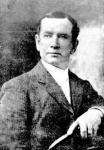Actor, director, film director, writer, troupe leader, tailor.
Stephen Australia Fitzgerald was born and raised in the Lower Hunter Valley town of West Maitland. His father Stephen Fitzgerald had been convicted at Maidstone, Kent for Robbery from Person with Violence and transported to Australia for 15 years (Columb, 18 April 2013, email). He later became a Maitland mail contractor and government-appointed metal merchant.
Almost always referred to publicly by the initials S. A. from the mid-1870s on (possibly as a means of distinguishing himself from his father), Fitzgerald was active in both local sports and theatre during his youth. Newspaper reports from 1876 up until the early 1880s indicate, for example, that he was associated with the Maitland Amateur Athletic Club, Maitland Rowing Club and Garrick Amateur Dramatic Club. After leaving school he pursued a career as a tailor, and within a short period of time had risen to the position of head cutter and manager for a business run by Mr W. Arren. Fitzgerald married Mary Ingram (1861- ) in 1878, and some five years later established his own business, the Clifton Tailoring Establishment. Perhaps as a result of his relative youth, and his heavy commitments various social and sporting groups, notably the Maitland Rowing Club and Maitland Musical Union, Fitzgerald and his business partner B. Nelson were forced to declare themselves insolvent in early 1885. Although his reputation as a businessman had been tarnished Fitzgerald retained a popular public profile through his theatrical activities and sporting associations up until he left the district in 1889.
On 13 and 14 February 1889, shortly before he left for Sydney, Fitzgerald was given a two night farewell benefit at the Victoria Theatre by a Maitland's amateur actors (assisted by two professional ladies). The following month he made his Sydney debut at the Criterion Theatre under the management of John Solomon (31 March). Given prominent billing by Solomon, he was described as 'the distinguished elocutionist and dramatic reader' (Sydney Morning Herald 29 March 1889, 2). A review published in the Evening News records:
Mr S. A. Fitzgerald, a recent addition to [the Criterion], recited Trowbridge's 'Roger and I,' and received a well-merited round of applause. He possesses a rich voice; his declamation is good, and his action and bearing are such as to make it pleasing to look at him while he is doing his work (ctd. Maitland Mercury 4 April 1889, p.5).
It is believed that his move to Sydney was the start of his professional career in the theatre. This period also included appearances as a paid actor with amateur companies such as the Government Printing Office's Dramatic and Musical Society (1893). He undertook a similar role in Grafton between May and August 1897 (Columb, 18 April 2013, email). Fitzgerald went on to work with many leading managers and companies operating between the 1890s and 1920s. Among the firms he has been linked to were Williamson, Garner and Musgrove, the Macmahon Brothers, Dion Boucicault, Alfred Dampier, J. C. Williamson, Maggie Moore, Alan Hamilton, Walter Bentley (Scottish tragedian), and Kate Howarde. In 1909 he also toured Queensland in a dramatic company head by Bentley that was produced by vaudeville entrepreneur Harry Clay.
In 1912 Fitzgerald put together a family troupe, billed as Fitzgerald's All Stars. The line-up comprised his actor sons Max Clifton and Lance Fitzgerald (aka Lance Vane), and recently-returned circus acrobat Jim Gerald. Between ca. 1912 and 1916 he also toured his own dramatic company. The troupe did not confine itself only to drama, however, with several newspaper reports in 1914 indicating that as with the All Stars, the troupe presented a mix of drama and vaudeville. When not involved with his own theatrical ventures he also appeared with other firms, including in 1915 Clifton-Vane company. Fitzgerald was active, too, in industrial aspects of the theatre. This involvement, among other things, saw him elected on to the committee of the Actors Union in 1911.
One of Fitzgerald's most famous roles was 'Dad' in Kate Howarde's Possum Paddock, which he played during the 1920s. (1919). Other popular roles were in such plays as The Bush Outlaw (1923) and Gum Tree Gully (1927). The late 1920s also saw him tour in a dramatic company operated by Sir Ben and John Fuller. Among his co-stars was vaudeville comedian, Charles Zoli. The company is known to have played engagements in Western Australia around November/December 1927.
While his career was primarily that of an actor, Fitzgerald nevertheless wrote at least one play, The Martyrdom of Nurse Cavill (1916). He is also now regarded as one of Australia's pioneering filmmakers. His first production as director was in 1907 when the Tait brothers' engaged him to direct Robbery Under Arms, their follow up production to TheStory of the Kelly Gang (the world's first ever feature length film). Three years later Fitzgerald directed, and possibly wrote the screenplay for, The Life and Adventures of John Vane, the Notorious Bushranger (1910). Produced by Cousens Spencer and filmed by cinematographer Ernest Higgens, the film also featured Fitzgerald's sons, Max, Lance and Jim. Fitzgerald's involvement in the film industry saw him undertake a variety of roles. In 1913, for example, he toured with the film Sweet Nell from Drury Lane, delivering a 'descriptive lecture' during the screening. In 1920 he also took on one of the principle roles (Ben Marsden) in Kenneth Brampton's 1920 adaptation of Robbery UnderArms.

